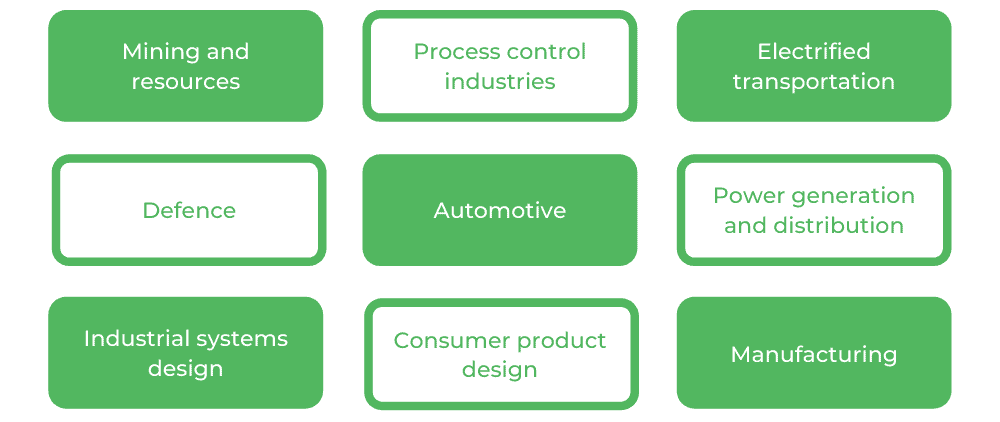Now that you’ve heard the facts about Electrical Engineering at RMIT, you’re probably wondering what it’s actually like!
To give us more details, Tahlya Torres, a fourth year Electrical Engineering student, told us what she really thinks about the degree.
Let’s dive in!
Why should you study an Electrical Engineering degree at RMIT?
Top 3 Pros of an Electrical Engineering Degree
Top 3 Cons of an Electrical Engineering Degree
Mistakes You Shouldn’t Make
Things to Know Before Starting RMIT Electrical Engineering
What Makes this Degree Different
Motivations for Studying RMIT Electrical Engineering
Potential Career Paths
Why should you study an Electrical Engineering degree at RMIT?
Electrical Engineering is ranked 9th in Australia compared to other Electrical and Electronic engineering degrees, making it a competitive option. It also has an accessible minimum ATAR of 76.40, although admissions are still in quite high demand.
An added bonus to this degree is that it is an Honours degree. This gives your degree an extra silver lining that might sweeten the deal for potential employers. Honours requires you to complete a capstone unit in your final year, which usually takes the form of a group project where you build and present your own design.
Tahlya didn’t start at RMIT as an Electrical Engineering student. After sometime as a Biomedical engineering student, she switched to Electrical Engineering and it’s been a great fit for her ever since.
Top 3 Pros of an Electrical Engineering degree
#1: Assessment style
Tahlya found the style of assessments for Electrical Engineering really suited well to her own needs and learning style.
While it might not be for everyone, Engineering assessments are usually exams or group presentations. Tahlya said, “I’ve always hated writing research papers, so working through exams was much better for me.”
There’s also a lot of group work — usually at least one group assessment per class — which Tahlya found a great way to make friends within her cohort.
“I felt very lucky to not have had any bad group work experiences. Everyone’s been super lovely and hard working,” she shared.
#2: Huge variety in specialisations
Another pro of Electrical Engineering at RMIT is the amount of variety within the degree itself.
Students are required to choose a specialist area in their third or fourth year. This can be energy conversion, power systems or high-voltage equipment.
A specialist area means you can focus on something in particular within the field of Electrical Engineering that you’re really passionate about, and improve your knowledge of that area to further your career potential. It’s especially helpful if you’re planning on going into a more niche part of Electrical Engineering as a career.
There are also heaps of subject options in fourth year that fit under these broader categories. More information can be found in the handbook!
For Tahlya, these specialisations allowed her to further her interest in power systems. At first it was “unexpected how much variety there is in Electrical Engineering — niches like renewables and electrical buildings that I’d never considered before”.
#3: Opportunities to learn practical skills
Electrical Engineering at RMIT also provides a great opportunity to learn practical skills that will boost your position in the industry. Students learn coding, graphic design, soldering and more.
Tahlya said she “enjoyed learning how to solder putting components on a circuit board” and that “coding is a super useful skill today, so I was very grateful to learn how to do it at uni”.
Top 3 Cons of an Electrical Engineering degree
#1: Not the most gender diverse cohort
As is common with Engineering faculties, there is a stark lack of gender balance in the cohorts. Tahlya found this quite confronting, as in many cases she was the only girl in her tutorials or labs.
It can be quite daunting and isolating to be in a classroom space. However, Tahlya found that when she did share classes with other girls, they formed really strong bonds.
She was also surprised by the amount of female staff within the faculty. This was especially helpful to making her feel comfortable in the degree as “representation matters. Seeing them and knowing they had done what I’m doing now was really empowering”.
#2: An intimidating workload
Electrical Engineering, like other Engineering courses, has quite a heavy workload, at least to begin with. Tahlya felt herself somewhat thrown in the deep end, but found that with hard work she was able to manage it quite well.
There is a lot of contact hours for this degree as well — between 20-40 hours a week could be spent on campus, with weekly lectures running for 2-3 hours, tutorials for 1-2 hours and bi-weekly labs for another 2-3 hours. It’s a huge commitment for study.
#3: Not enough industry-based learning
While the degree offers plenty of opportunities to learn new skills, it is lacking some industry-based units. Students are expected to be self-motivated to get internships, rather than required to.
The capstone unit does bring in some industry experts, and allows students to solve problems for particular firms. However, there could always be more. Experience never hurts!
Any regrets?
Tahlya didn’t do Physics in high school which made the transition into Electrical Engineering difficult to begin with. She said, “Even though it isn’t a prerequisite, I definitely recommend having some background in Physics, to make life easier for yourself.”
However, Tahlya did eventually catch up, so it was not impossible to succeed without Physics.
What do you wish you had known before starting RMIT Electrical Engineering?
Before starting Electrical Engineering, it’s important to know that it is a challenging degree. There’s a lot of Maths and Physics involved, as well as a lot of time spent in-classes.
Tahlya found that she “shed a lot of tears around assessment time”, especially in her first two years, but has regardless found the degree very rewarding. The high contact hours do mean that your knowledge is being consistently reinforced through discussion and practice with lecturers, tutors and fellow classmates.
It’s also important to be aware of the large amount of group work necessary to complete this degree. Arguably one of the most important parts is the capstone units necessary to get your Honours degree. These are usually group work units, so it’s important that you’re prepared to work as a team.
What makes this degree different from the ones offered at other universities?
What sets Electrical Engineering at RMIT apart from other universities is its Honours component. Made up of a capstone unit, this requires work-integrated learning which can take place within industry settings.
The unit lasts the entirety of fourth year and asks students to work in groups to solve an industry problem. Each group gets a supervisor, who usually works in-industry, and chooses a topic from the list. Tahlya talked about topics her friends had chosen, such as building parts for an electrical race car.
What inspired you to choose UNSW Electrical Engineering?
Despite the difficulty of this degree at times, there’s still a lot of fun to be had. An example is the Engineers Without Borders challenge, which first year students are required to take part in.
Students work in teams to use their engineering skills to provide solutions for less fortunate communities, using only the materials available to these communities. It’s a highly rewarding opportunity, as it not only helps them to further their engineering problem solving skills, but also gives back to a community in need of help.
What are the possible career paths?
As an electrical engineer, there are many different industries you can go into!
- Mining and resources
- Process control industries
- Electrified transportation
- Defence
- Automotive
- Power generation and distribution
- Industrial systems design
- Consumer product design
- Manufacturing
Tahlya has already secured a graduate role in a power team at an engineering firm. Power systems has been her ultimate passion while studying Electrical Engineering, so she’s very excited to be able to apply that to her career.
Elizabeth Noonan is a Content Writer for Art of Smart and an undergraduate student at the University of Sydney. There, she studies a Bachelor of Arts/Advanced Studies, majoring in Media and Communications and French. Elizabeth is a huge movie buff and hopes to go into journalism after she finishes her degree.





